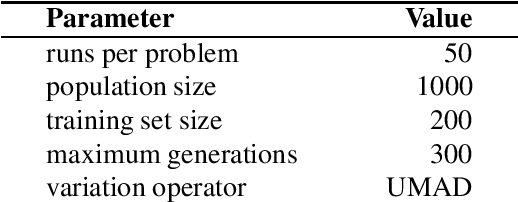The Environmental Discontinuity Hypothesis for Down-Sampled Lexicase Selection
Paper and Code
May 31, 2022



Down-sampling training data has long been shown to improve the generalization performance of a wide range of machine learning systems. Recently, down-sampling has proved effective in genetic programming (GP) runs that utilize the lexicase parent selection technique. Although this down-sampling procedure has been shown to significantly improve performance across a variety of problems, it does not seem to do so due to encouraging adaptability through environmental change. We hypothesize that the random sampling that is performed every generation causes discontinuities that result in the population being unable to adapt to the shifting environment. We investigate modifications to down-sampled lexicase selection in hopes of promoting incremental environmental change to scaffold evolution by reducing the amount of jarring discontinuities between the environments of successive generations. In our empirical studies, we find that forcing incremental environmental change is not significantly better for evolving solutions to program synthesis problems than simple random down-sampling. In response to this, we attempt to exacerbate the hypothesized prevalence of discontinuities by using only disjoint down-samples to see if it hinders performance. We find that this also does not significantly differ from the performance of regular random down-sampling. These negative results raise new questions about the ways in which the composition of sub-samples, which may include synonymous cases, may be expected to influence the performance of machine learning systems that use down-sampling.
 Add to Chrome
Add to Chrome Add to Firefox
Add to Firefox Add to Edge
Add to Edge